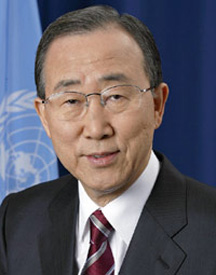Guyana earlier this month was among several countries that abstained from a United Nations General Assembly vote on a resolution on Syria that condemned the country’s indiscriminate use of heavy weapons in civilian areas and its widespread violations of human rights in the strife-torn country.
The United Nations General Assembly on August 3 voted overwhelmingly in support of the resolution. Gravely concerned by the escalating violence in Syria, the UN General Assembly on July 30th strongly condemned Damascus’ indiscriminate use of heavy weapons in civilian areas and its widespread violations of human rights, demanding that all parties “immediately and visibly” commit to ending a conflict that UN Secretary-General Ban Ki-moon called “a test of everything this Organization stands for.”
Media reports say that the death toll in the Middle Eastern country has since topped 25,000. When approached for comment earlier this week on Guyana’s decision to abstain from voting on the Syria resolution, Minister of Foreign Affairs, Carolyn Rodrigues-Birkett said that she would prefer to send the text with regards to the reason. Up to yesterday, this was not received and Stabroek News was informed that the minister is now travelling overseas.

However, according to UN records, the representative of Guyana said that tragedy was unfolding in Syria that should have been avoided. “He condemned all violations of human rights by all. He was equally concerned by the humanitarian impact on the affected population. All perpetrators must be held to account. The Syrian Govern-ment must take responsibility to end the violence, protect civilians and fully comply with its obligations under international law,” the UN Department of Public Information said in a report on the proceedings.
Blind eye
The report also quoted Guyana’s representative as saying that: “At the same time, the international community could not turn a blind eye to the harmful acts of opposition groups, but must look at harmful acts committed by all. The text fell short in that regard. In the interest of the Syrian people, the United Nations must remain unceasing in its efforts to end the bloodshed on all sides and assist in the search for a viable solution.” He added that the six-point plan remained valid, and he supported the continued efforts of the Secretary-General towards that end. Given the gravity of the situation, he said it was imperative that the Council urgently fulfil its Charter responsibilities and that the international community must urgently unite to address the needs of the Syrian people.
By a recorded vote of 133 in favour to 12 against, with 31 abstentions, the Assembly overwhelmingly adopted the resolution expressing its concern about a raft of gross human rights violations being carried out by Syrian Government forces, systematic attacks against civilians, and the increasing use of “heavy weapons, armour and the air force against populated areas”. It was also concerned by the humanitarian impact of the violence, including repression of fundamental rights, and the influx of Syrian refugees into neighbouring countries.
Apart from Guyana those countries that abstained from voting were Algeria, Angola, Antigua and Barbuda, Armenia, Burundi, Ecuador, Eritrea, Fiji, Ghana, India, Kazakhstan, Kyrgyzstan, Lao People’s Democratic Republic, Lebanon, Lesotho, Madagascar, Mali, Namibia, Nepal, Pakistan, Saint Lucia, Saint Vincent and the Grenadines, Samoa, Sierra Leone, Solomon Islands, Sri Lanka, Suriname, Uganda, United Republic of Tanzania, and Vietnam.
The resolution deplored the Security Council’s failure to agree on measures to ensure the Syrian authority’s compliance with its decisions — most recently when, on 20 July, China and the Russian Federation vetoed a Council resolution that threatened sanctions if demands to end the spiralling violence were not met — the Assembly expressed its determination to seek ways and means to provide protection for the Syrian civilian population.
Accountability
Its four-part resolution drafted by the Arab Group and sponsored by scores of other countries covered accountability, the humanitarian situation, political transition and follow-up. In it, the Assembly stressed that rapid progress on a political transition represented the “best opportunity” to resolve the 18-month-long crisis peacefully. It demanded in that regard that all the parties to the conflict work with the Office of the Joint Special Envoy of the United Nations and the League of Arab States to implement rapidly the transition plan for Syria set forth in the final communiqué issued by the Action Group on 30 June.
While the Assembly’s action came less than 24 hours after the Special Envoy, Kofi Annan, announced in frustration that he would not renew his mandate when it expired at the end of August, the resolution nevertheless fully backed his demand that the first step in ending the violence must be made by the Syrian authorities, and therefore called on the Government to fulfil immediately its commitment to cease the use of heavy weapons and complete the withdrawal of Government troops, according to the report on the proceedings.
Following threats by the Syrian authorities to use chemical or biological weapons in the conflict, the resolution also demanded that the government refrain from using or transferring such weapons to non-State actors and that it respect international obligations regarding those weapons. The text went on to condemn all violence, “regardless of where it comes from, including terrorist acts”, and demanded that all parties immediately implement Security Council resolutions 2042 (2012) and 2043 (2012), both adopted in April, in order to achieve a cessation of all armed violence, “thereby creating an atmosphere conducive to […] a Syrian-led political transition that meets the aspirations of the Syrian people”.
Before the vote, Secretary-General Ban drew chilling comparisons between the deadly fighting in Aleppo — “the epicentre of a vicious battle between the Syrian Government and those who wish to replace it” — and Srebrenica, which he said represented one of the darkest chapters in UN history, “when the international community failed to protect civilians from slaughter.”

